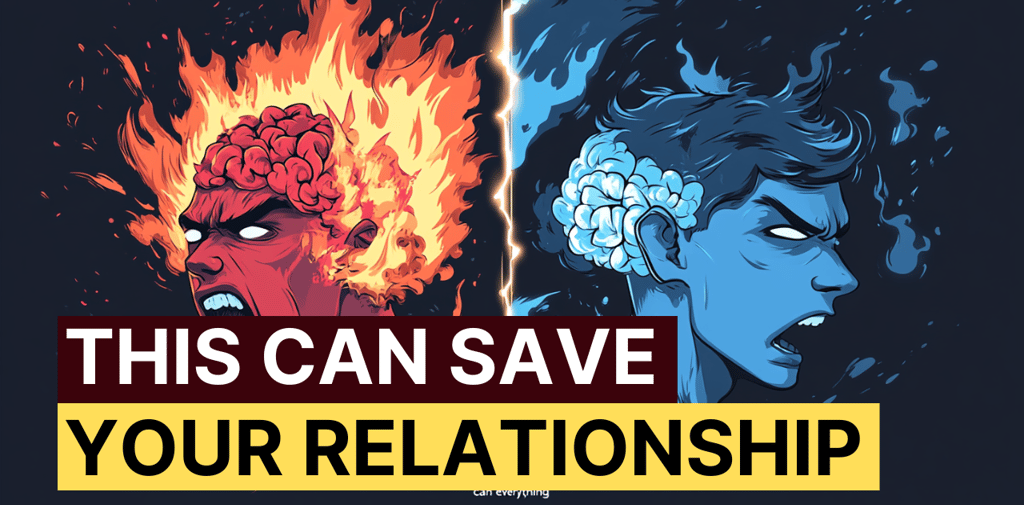How to Stay Calm When You're Angry
Blog post description.We’ve all said things we regret in the heat of an argument. This post breaks down why it happens—using the science of the brain’s “hot” and “cold” systems—and gives you two powerful tools to stay calm and in control during emotional moments. Learn how a simple pause and a few deep breaths can save your mood, your relationships, and your peace of mind.
6/7/20254 min read


How to Avoid Saying Things You Regret During a Fight
Have you ever gotten into an argument, said something you didn’t mean, and then spent the whole day feeling awful about it?
You replay the words in your head, thinking, “Why did I say that?” The guilt lingers. Your mood gets worse. And sometimes, the damage to the relationship is harder to fix than the argument itself.
This is a very human experience. But why does it happen?
Why do we sometimes say things that hurt the people we care about—things we know deep down we don’t really mean?
The Battle of Emotion vs. Reason
In the heat of the moment, we often act emotionally, not logically. We speak quickly, fueled by anger, frustration, or fear. Later, when the emotions cool down, we regret it. We think, “I should have just stayed calm.”
Understanding why this happens can help us prevent it.
Psychologist Walter Mischel described two systems in the brain that control our responses: the hot system and the cold system.
The hot system is fast, emotional, and reactive. It’s responsible for feelings like fear and anger. When you're under stress or in a heated argument, this system takes over. You snap. You shout. You say things impulsively.
The cold system, on the other hand, is slower and more thoughtful. It allows you to plan, evaluate, and make rational decisions. This is the part of the brain you want in charge during conflict—but it often gets shut out by the heat of emotion.
From an evolutionary perspective, the hot system was essential for survival. Thousands of years ago, reacting quickly to danger—like running from a wild animal—was life-saving. There was no time to sit down and think things through. The instinct to act fast kept us alive.
But today, most of our “dangers” are not life-threatening. They’re emotional conflicts—arguments with partners, colleagues, or friends. The same fast reactions that once protected us can now damage our relationships and mental well-being.
So, how do we stop the hot system from hijacking our brain?
How can we avoid saying things we’ll regret?
Two Powerful Strategies: Pause and Breathing
The good news is that you don’t have to be a victim of your emotions. There are practical ways to switch from your hot system to your cold system in moments of conflict.
Let’s look at two simple but powerful strategies: Pause and Breathing.
1. The Pause Strategy
Giving yourself even a few seconds before you react can change everything. It can be the difference between exploding in anger and responding calmly.
Here are a few ways to create a pause:
Leave the room. If you feel overwhelmed, step outside for a minute. Walk around. Get some air. Just removing yourself from the environment can help you cool down.
Stay silent for 20 seconds. Don’t speak immediately. Let your body and mind calm down. Use those 20 seconds to reflect. Remind yourself that the goal is not to “win” the argument but to maintain the relationship.
Talk to yourself internally. Say something calming in your head like, “This is temporary. I can stay calm. I don’t want to hurt them.” Self-talk can shift your focus from reaction to reflection.
Tell the other person you need time. You don’t have to solve everything right away. It’s okay to say, “I need a moment to think before we continue.”
Don’t treat the other person as the enemy. In most cases, the person you're arguing with isn’t trying to hurt you. They’re also emotional, perhaps feeling unheard or misunderstood. Try to remember: It’s both of you vs. the problem—not you vs. them.
2. The Breathing Strategy
Your breath is one of the fastest ways to shift from stress to calm. When you're angry or anxious, your breathing becomes shallow and fast. By changing the way you breathe, you can signal to your body that it's safe to relax.
Try this:
Slow down your breath. Inhale deeply through your nose for four seconds. Hold it for a moment. Then exhale slowly through your mouth for six seconds. Repeat this a few times. You’ll notice your heart rate slows down and your mind becomes clearer.
Splash your face with cold water. Cold water triggers a calming response in your body. If you can’t take a cold shower, just washing your face or hands with cold water can help you reset.
Practice Makes Progress
These techniques won’t be easy at first. When you’re in the middle of an argument, your hot system is powerful. You’ll want to react immediately. But the more you practice these strategies, the better you’ll get.
Start small. Even if you remember to pause just once, or take one deep breath before responding, that’s a win. Over time, these habits will strengthen your ability to stay calm under pressure.
You’re not trying to be perfect—you’re trying to be better than yesterday.
And that effort matters. It protects your relationships. It protects your peace of mind. It gives you the space to respond from your best self—not your most reactive self.
So next time you feel that surge of anger or frustration, remember: you have a choice.
Pause. Breathe. Choose to act with intention.
It only takes a moment to shift everything.
